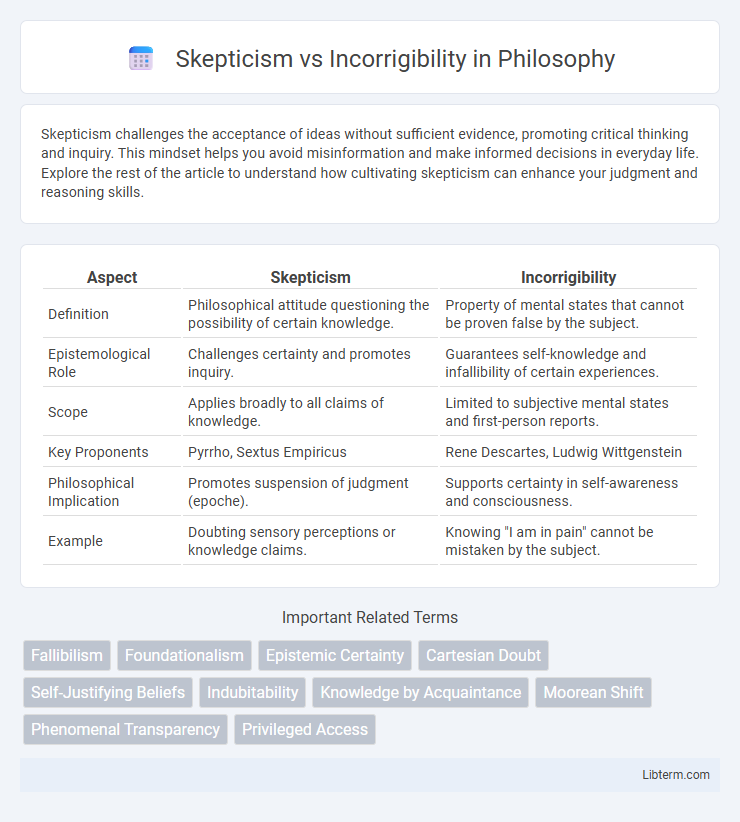Skepticism challenges the acceptance of ideas without sufficient evidence, promoting critical thinking and inquiry. This mindset helps you avoid misinformation and make informed decisions in everyday life. Explore the rest of the article to understand how cultivating skepticism can enhance your judgment and reasoning skills.
Table of Comparison
| Aspect | Skepticism | Incorrigibility |
|---|---|---|
| Definition | Philosophical attitude questioning the possibility of certain knowledge. | Property of mental states that cannot be proven false by the subject. |
| Epistemological Role | Challenges certainty and promotes inquiry. | Guarantees self-knowledge and infallibility of certain experiences. |
| Scope | Applies broadly to all claims of knowledge. | Limited to subjective mental states and first-person reports. |
| Key Proponents | Pyrrho, Sextus Empiricus | Rene Descartes, Ludwig Wittgenstein |
| Philosophical Implication | Promotes suspension of judgment (epoche). | Supports certainty in self-awareness and consciousness. |
| Example | Doubting sensory perceptions or knowledge claims. | Knowing "I am in pain" cannot be mistaken by the subject. |
Understanding Skepticism: An Overview
Skepticism challenges the certainty of knowledge by questioning the reliability of our beliefs and perceptions, emphasizing doubt as a fundamental part of philosophical inquiry. It contrasts with incorrigibility, which asserts some beliefs are immune to error, particularly those concerning immediate experiences or self-awareness. Understanding skepticism involves recognizing its role in probing the limits of human knowledge and the conditions under which claims can be considered justified or true.
Defining Incorrigibility in Philosophy
Incorrigibility in philosophy refers to the idea that certain beliefs or mental states are immune to error for the person who holds them, meaning they cannot be proven wrong by the individual's own perspective. This concept is central in debates about skepticism, as incorrigible beliefs serve as foundational certainties that skepticism struggles to undermine. Philosophers often analyze incorrigibility to clarify the limits of human knowledge and the trustworthiness of subjective experience.
Historical Roots: Skepticism and Incorrigibility
Skepticism originated in ancient Greek philosophy with Pyrrho and Sextus Empiricus challenging the possibility of certain knowledge, emphasizing continuous questioning and suspension of judgment. Incorrigibility, rooted in Cartesian philosophy, particularly in Descartes' Meditations, asserts the certainty of self-knowledge through indubitable first-person judgments and mental states. Both concepts shaped epistemology by contrasting external doubt with internal certainty regarding knowledge and belief.
Key Thinkers and Their Perspectives
Rene Descartes is a central figure in the debate between skepticism and incorrigibility, famously asserting that while sensory knowledge can be doubted, the self's existence as a thinking entity is incorrigible. David Hume represents skepticism by challenging the certainty of knowledge derived from experience, emphasizing the limitations of human understanding. Ludwig Wittgenstein later critiqued both positions, arguing that incorrigibility depends on language games and contexts, thus complicating the notion of absolute certainty or radical doubt.
Direct Contrast: Skepticism vs Incorrigibility
Skepticism challenges the possibility of certain knowledge by doubting the reliability of all beliefs, while incorrigibility asserts that some beliefs, particularly self-aware mental states, cannot be mistaken or corrected by external evidence. Skepticism posits that perception and cognition are fallible and subject to error, whereas incorrigibility maintains that first-person reports of mental states are infallible and immune to revision. This direct contrast highlights the skepticism's emphasis on universal doubt versus incorrigibility's focus on the certainty of subjective experience.
Epistemological Implications
Skepticism challenges the certainty of knowledge by questioning the reliability of our beliefs and senses, highlighting potential limits in human understanding. Incorrigibility asserts that certain self-related beliefs, such as "I am in pain," are immune to error and provide indubitable evidence for the existence of subjective experience. This contrast shapes epistemological debates by emphasizing the tension between doubt about external knowledge and the undeniability of some first-person mental states.
Practical Examples in Modern Thought
Skepticism challenges the certainty of knowledge by questioning the reliability of perceptions and beliefs, as seen in David Hume's problem of induction, where expectations based on past experience lack absolute justification. Incorrigibility asserts that some mental states, like the immediate awareness of one's own thoughts, are immune to error, demonstrated by the undeniable experience of pain or belief. Modern philosophical debates employ these distinctions to explore the limits of self-knowledge and epistemic justification, influencing fields like cognitive science and artificial intelligence.
Critiques and Controversies
Skepticism faces critiques for its reliance on radical doubt, often accused of leading to epistemic paralysis by questioning all knowledge claims without offering constructive alternatives. Incorrigibility, the principle that certain beliefs are immune to error, is controversial because critics argue it overestimates self-awareness and ignores cases of misjudgment or false belief in introspection. The ongoing debate centers on whether incorrigibility can sufficiently counter skeptical challenges or merely shifts the problem of epistemic certainty.
Influence on Contemporary Philosophy
Skepticism challenges the certainty of knowledge and drives contemporary philosophy to rigorously examine the limits of human understanding, fostering developments in epistemology. Incorrigibility, claiming that certain beliefs are immune to error, influences debates on self-knowledge and the nature of first-person authority. Together, these concepts shape discussions on the reliability of introspection and the foundation of epistemic justification in modern philosophical thought.
Future Directions in Epistemological Debate
Future directions in the epistemological debate on skepticism versus incorrigibility emphasize refining the understanding of self-knowledge and the limits of doubt. Research explores incorporating advances in cognitive science and philosophy of mind to evaluate the reliability of first-person beliefs against skeptical challenges. Emerging frameworks aim to reconcile incorrigibility claims with fallibilist epistemology, promoting nuanced solutions to longstanding issues of epistemic certainty.
Skepticism Infographic

 libterm.com
libterm.com